A Premier Summer Program for High School Students
by Melanie Banks & Nella Quasnitschka
UConn Pre-College Summer provides high school students the opportunity to live and learn at a nationally ranked public university campus through four challenging and intensive one-week sessions. At Pre-College Summer, part of our mission is to provide an exploratory experience in which students gain an understanding of the college classroom. Students work with and learn from University faculty while exploring the nuances of college life. Interacting with peers in the residence halls and faculty in the classroom provide students the opportunity to create individual successes. We consider a student successful in Pre-College Summer if they use the opportunity to learn more about their future aspirations, find that the course they enrolled in is a good (or bad) fit to pursue as a potential college major, or feel better prepared for learning and growing in a college or university setting.
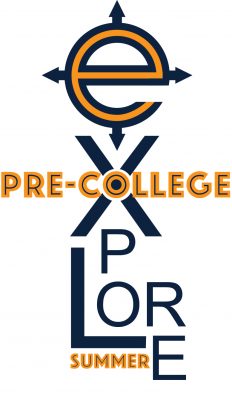 Through supportive and caring faculty members, our students are able to feel a sense of pride and accomplishment while attending Pre-College Summer. This relates to students' readiness to learn in a college setting and the ability to see how their passions may transform into a college major. Dr. Kimberly Bergendahl, Assistant Professor in Residence from the Political Science Department and Pre-College Summer faculty of the Pre-Law course, has had wonderful experiences with Pre-College Summer students, both during and after their time at UConn Pre-College Summer. Dr. Bergendahl has connected with students during their time in the program and is currently working with a former PCS student, now a UConn honors student, studying political science and conducting undergraduate research. This continued collaboration is an example of how our faculty members can foster incredibly transformative learning experiences through the Pre-College Summer Program that help students build connections and guide them toward a path to success.
Through supportive and caring faculty members, our students are able to feel a sense of pride and accomplishment while attending Pre-College Summer. This relates to students' readiness to learn in a college setting and the ability to see how their passions may transform into a college major. Dr. Kimberly Bergendahl, Assistant Professor in Residence from the Political Science Department and Pre-College Summer faculty of the Pre-Law course, has had wonderful experiences with Pre-College Summer students, both during and after their time at UConn Pre-College Summer. Dr. Bergendahl has connected with students during their time in the program and is currently working with a former PCS student, now a UConn honors student, studying political science and conducting undergraduate research. This continued collaboration is an example of how our faculty members can foster incredibly transformative learning experiences through the Pre-College Summer Program that help students build connections and guide them toward a path to success.
Interested in joining us? Join our mailing list at pcs.uconn.edu to learn more. Summer 2020 applications will open in December, 2019.
Student Feedback
by Katiya P., PSC student, Doral, Florida
It was an easy decision for me and my family. After reviewing the curriculum for the Pre-Vet program, the campus environment and the access to Avery Point for the lab and dissection, we were convinced we were making the right choice. UConn promised a hands on experience and they delivered. There were hands on experiences at the Avery Campus almost every day.
The well-structured schedule worked will for me! It started with a healthy breakfast with other students from around the country. Each day I attended lectures on medical and animal topics. On select days, a comfy bus took us to Avery Point where we would discuss topics, perform labs. Perform dissections and interact with marine animals in their environment all while enjoying each other and the experience. At the end of the day we enjoyed a variety of dinner choices and an array of activities to suit everyone’s social needs. I loved the choice of activities and the game room!
My advice is what I told myself before I left the program. Don’t be afraid to try new things, to lead a discussion, or to attend a program far from home. By pushing my boundaries and comfort zone in the subject I love, I was able to participate in a program that was rewarding and life changing!
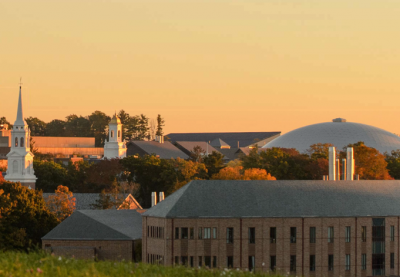 Being a student is an important role and a title that is central to my identity. I love learning and the longer I have been a student, the clearer it becomes that sharing my thoughts and passions on what I read is central to being a great student. We should always be considering and reevaluating our academic passions, as well as sharing our thoughts with important people around us. When I graduated high school I had pretty clear ideas on what I wanted to study but not very clear ideas on how I was going to use it. I loved foreign languages and politics. I was lucky to have studied Russian throughout my four years in high school and was very excited to continue learning Russian and start learning German at UConn. Some people encouraged me to go into international business, because, that's where the money is. Luckily I was surrounded by people who supported my interests and allowed me to focus my passions without monetizing them. It made my studies and self discovery that much more enriching. I did not go into business; rather, I stayed at the interesting crossroads of language, culture, and politics. True to a liberal arts education, my degree prepared me to do a broad array of things because I learned how to analyze and problem-solve and was practiced at applying rigorous methodologies of inquiry. All of these skills have benefited the Office of Early College Programs and allowed me to do interesting things with my life.
Being a student is an important role and a title that is central to my identity. I love learning and the longer I have been a student, the clearer it becomes that sharing my thoughts and passions on what I read is central to being a great student. We should always be considering and reevaluating our academic passions, as well as sharing our thoughts with important people around us. When I graduated high school I had pretty clear ideas on what I wanted to study but not very clear ideas on how I was going to use it. I loved foreign languages and politics. I was lucky to have studied Russian throughout my four years in high school and was very excited to continue learning Russian and start learning German at UConn. Some people encouraged me to go into international business, because, that's where the money is. Luckily I was surrounded by people who supported my interests and allowed me to focus my passions without monetizing them. It made my studies and self discovery that much more enriching. I did not go into business; rather, I stayed at the interesting crossroads of language, culture, and politics. True to a liberal arts education, my degree prepared me to do a broad array of things because I learned how to analyze and problem-solve and was practiced at applying rigorous methodologies of inquiry. All of these skills have benefited the Office of Early College Programs and allowed me to do interesting things with my life.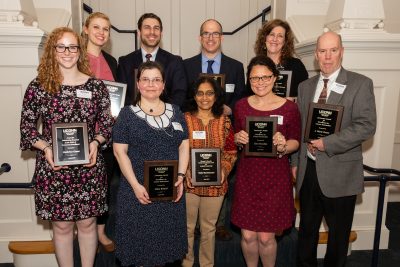 We recognized all award winners at our annual Awards Ceremony in April, presenting them with a plaque and a monetary award over a celebratory dinner with family, friends, and colleagues. It was a night full of admiration and appreciation for the dedication each award winner displays day in and out for their high schools and their students. All award winners have exceeded the program expectations and excelled in preparing their students for the next level in their education.
We recognized all award winners at our annual Awards Ceremony in April, presenting them with a plaque and a monetary award over a celebratory dinner with family, friends, and colleagues. It was a night full of admiration and appreciation for the dedication each award winner displays day in and out for their high schools and their students. All award winners have exceeded the program expectations and excelled in preparing their students for the next level in their education.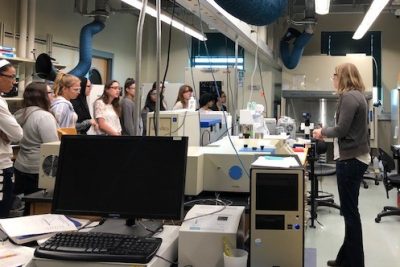 The April 25th Science Activity Day was coordinated by the UConn Early College Experience Program Office and Dr. Selampinar, with science activities hosted by Dr. Rouge and Dr. Ung and their graduate students (Alyssa H., Saketh G., Mark T., Kaitlynn A., Erin B., Nishya M., and Rebecca F.). To kick off the day's events, the high school students learned about how an interest in chemistry can prepare them for a variety of job paths, including working in a lab as a researcher someday. In the afternoon the students broke into two sections to learn about molecules that can fluorescence and about biomacromolecules that can build structures at the nanoscale. During Dr. Ung's activities, students were taught an overview of the principles of fluorescence and how light interacts with molecules. They made glow sticks and were exposed to scientific thinking. The students were asked to determine why molecules glowed and made simple hypotheses that they verified experimentally. Later, the students gathered and shared the results of their experiments to conclude the relationship between chemical structure and a molecule's ability to glow.
The April 25th Science Activity Day was coordinated by the UConn Early College Experience Program Office and Dr. Selampinar, with science activities hosted by Dr. Rouge and Dr. Ung and their graduate students (Alyssa H., Saketh G., Mark T., Kaitlynn A., Erin B., Nishya M., and Rebecca F.). To kick off the day's events, the high school students learned about how an interest in chemistry can prepare them for a variety of job paths, including working in a lab as a researcher someday. In the afternoon the students broke into two sections to learn about molecules that can fluorescence and about biomacromolecules that can build structures at the nanoscale. During Dr. Ung's activities, students were taught an overview of the principles of fluorescence and how light interacts with molecules. They made glow sticks and were exposed to scientific thinking. The students were asked to determine why molecules glowed and made simple hypotheses that they verified experimentally. Later, the students gathered and shared the results of their experiments to conclude the relationship between chemical structure and a molecule's ability to glow.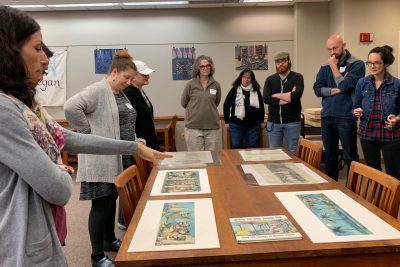 Art: Along with UConn ECE Faculty Coordinator, Cora Lynn Deibler, certified UConn ECE ART 1030: Drawing I Instructors were able to visit the Thomas J. Dodd Center on the Storrs campus to take a firsthand look at the Maurice Sendak archives. Recently, the Maurice Sendak Foundation chose to share Sendak's archives with the University of Connecticut who are now housing and stewarding the Collection. Project Archivist, Carla Nguyen shared her knowledge with the group who were able to learn more about Sendak's life, and view his original artwork, sketches, books and other materials.
Art: Along with UConn ECE Faculty Coordinator, Cora Lynn Deibler, certified UConn ECE ART 1030: Drawing I Instructors were able to visit the Thomas J. Dodd Center on the Storrs campus to take a firsthand look at the Maurice Sendak archives. Recently, the Maurice Sendak Foundation chose to share Sendak's archives with the University of Connecticut who are now housing and stewarding the Collection. Project Archivist, Carla Nguyen shared her knowledge with the group who were able to learn more about Sendak's life, and view his original artwork, sketches, books and other materials.